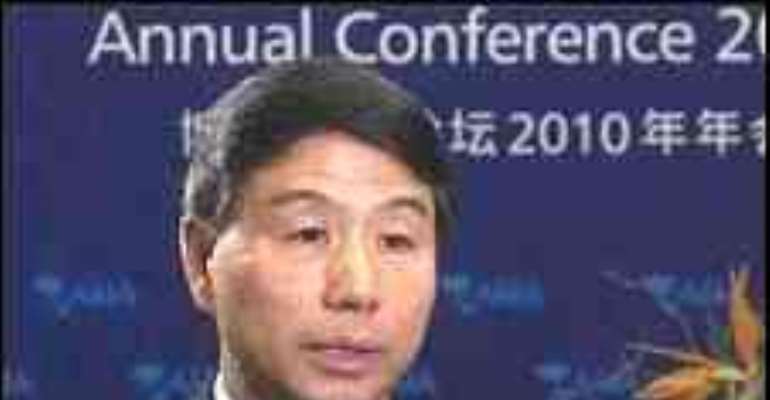YUAN RISE BAD FOR CHINA’S ECONOMY, MINISTER WARNS

Yi Xiaozhun says the currency has been turned into a political issue
Allowing the yuan to strengthen against the dollar would hurt the Chinese economy in the short-term, a senior Chinese official has told the BBC.
But Yi Xiaozhun, a vice-minister in the commerce ministry, said he expected the currency to rise in the longer-term.
He accused other countries of trying to force its appreciation now.
There has been speculation that China is preparing to allow the yuan to appreciate before President Hu Jintao arrives in Washington next week.
Mr Yi was speaking at the Boao Forum for Asia, a gathering of senior officials and business figures from across Asia on the southern Chinese island of Hainan.
China's commerce ministry is close to the country's exporters, and reports suggest its officials have been lobbying hard against those inside the Chinese government who say the value yuan should now be allowed to rise.
Politicised debate
China, in effect, pegged its currency to the weakening US dollar in late 2008 when the effects of the global economic crisis started to be felt here .
That has given the country's exporters an unfair advantage ever since, critics say, because when the value of the yuan is artificially low, their goods appear cheaper.
Some American politicians and academics… have politicised this argument
Yi Xiaozhun, Chinese commercy ministry vice-minister
Mr Yi says the crisis is not yet over, and so an increase in the value of the yuan now would hurt China's economy.
He argues the biggest headache for China is that this is no longer simply an economic problem but has become the focus of relations between the two countries.
“Some American politicians and academics, because of hardship at home, have politicised this argument,” he says.
“They are blaming other countries, including China, for their own problems. This is unreasonable.”
The vice commerce minister refuses to be drawn on what is the appropriate exchange rate for the yuan and the dollar.
Rising imports
But he says the current level is reasonable and has helped keep the country's trade flows stable.
It would be wrong to see his comments as ruling out completely any rise in the short-term though.
Instead they demonstrate the level of opposition to such a move that exists within some factions in the Chinese government.
The dollar-yuan exchange rate is a sensitive issue for the US and China
Others in Beijing are reported to be arguing that China needs to change its policy.
Holding down the value of the yuan through market intervention has been costly.
He also hinted that China is likely to announce a trade deficit for March when the monthly trade figures are released at the weekend – the first monthly deficit in more than five years.
It is largely the result of rising prices for commodities and the huge demand for raw materials to power China's booming economy.
Chinese officials have seized on the deficit to insist the country has an “open” policy towards trade, while stressing it is likely to be a short-lived phenomenon, as exports are recovering.
“Our stimulus measures are still having an effect,” he said.
“In the last few months we've imported huge amounts of iron ore, copper, crude oil, coal and steel. This is why our imports have grown so strongly.
“At the same time the US and European markets for our goods are still weak, so even though our exports are recovering, they're not recovering as fast as our imports are growing.”
The minister said he could not say whether or not this was a long-term trend. Economists suggest it is likely to be a short-term effect.
“China doesn't want a trade surplus or a trade deficit,” Mr Yi insisted.
“We want our trade to be balanced. Our efforts to raise domestic consumption are working. So we can't simply regard the deficit as a bad thing.”
